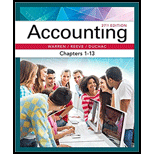
Internal Control: Internal control refers to the policies, and plans of the business organization along with other measures with a view to safeguard its assets, encourage the employees to adhere to the plans, to improve on the operational efficiency, and to ensure correct and reliable accounting information. Internal control is a process which ensures continuous reliability of accomplishment of a company’s objectives, related to operations, financial reporting, and in conformity with laws and regulations.
The following are the some of the internal control procedures:
- Competent personnel, rotating duties, and mandatory vacations
- Separating responsibilities for related operations
- Separating operations, custody of assets, and accounting
- Proofs and security measures
To state: Whether J’s handling of internal control situations are acceptable or not.
Trending nowThis is a popular solution!

Chapter 8 Solutions
Bundle: Accounting, Chapters 1-13, 27th + Cengagenowv2, 2 Terms Printed Access Card For Warren/reeve/duchac's Accounting, 27th
- What is the actual total direct materials cost for the current period of this accounting question?arrow_forwardHonda Company had sales of $165,000, sales discounts of $4,200, and sales returns of $5,300. Honda Company's net sales equal: A. $172,500 B. $165,000 C. $155,500 D. $9,500 E. $160,800arrow_forwardGeneral accountingarrow_forward
- MJ's Jewellery reported the following amounts at the end of the year: total jewellery sales = $650,000; sales discounts = $15,000; sales returns= $40,000; sales allowances = $20,000. Compute net sales.arrow_forwardPlease provide problem with accountingarrow_forwardDanforth Systems has: • • • Current assets = $8,400 Net fixed assets = $35,200 Current liabilities = $7,100 Long-term debt = $15,500 a) The value of the shareholders' equity account. b) The net working capital.arrow_forward
 Auditing: A Risk Based-Approach (MindTap Course L...AccountingISBN:9781337619455Author:Karla M Johnstone, Audrey A. Gramling, Larry E. RittenbergPublisher:Cengage Learning
Auditing: A Risk Based-Approach (MindTap Course L...AccountingISBN:9781337619455Author:Karla M Johnstone, Audrey A. Gramling, Larry E. RittenbergPublisher:Cengage Learning Accounting Information SystemsAccountingISBN:9781337619202Author:Hall, James A.Publisher:Cengage Learning,
Accounting Information SystemsAccountingISBN:9781337619202Author:Hall, James A.Publisher:Cengage Learning, Auditing: A Risk Based-Approach to Conducting a Q...AccountingISBN:9781305080577Author:Karla M Johnstone, Audrey A. Gramling, Larry E. RittenbergPublisher:South-Western College Pub
Auditing: A Risk Based-Approach to Conducting a Q...AccountingISBN:9781305080577Author:Karla M Johnstone, Audrey A. Gramling, Larry E. RittenbergPublisher:South-Western College Pub College Accounting, Chapters 1-27AccountingISBN:9781337794756Author:HEINTZ, James A.Publisher:Cengage Learning,
College Accounting, Chapters 1-27AccountingISBN:9781337794756Author:HEINTZ, James A.Publisher:Cengage Learning, Survey of Accounting (Accounting I)AccountingISBN:9781305961883Author:Carl WarrenPublisher:Cengage Learning
Survey of Accounting (Accounting I)AccountingISBN:9781305961883Author:Carl WarrenPublisher:Cengage Learning Financial Accounting: The Impact on Decision Make...AccountingISBN:9781305654174Author:Gary A. Porter, Curtis L. NortonPublisher:Cengage Learning
Financial Accounting: The Impact on Decision Make...AccountingISBN:9781305654174Author:Gary A. Porter, Curtis L. NortonPublisher:Cengage Learning





